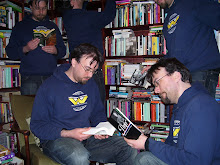Richard Beard is an unusual novelist, ranging all over the place in his work. His last novel,
Lazarus is Dead, featured its Biblical hero, alive again, mystified and almost angry at his resurrection. An earlier novel, Damascus, was set on a single day, yet featured the years-long relationship between its two main characters from the beginning onwards--no matter what scene as being described, it took place on 1st November, 1993 (and used only people, places and names taken from a copy of that date's
Times newspaper).
His newest, the excellent
Acts of the Assassins, takes off from both of these earlier works: it's about Gallio, a Roman counter-insurgency investigator in the Middle East trying to track down Jesus, a cult leader, who may or may not be dead, through his followers--all of whom are being killed in
nastily baroque ways.
 |
| The contents page: nobody comes out of this well... |
But the novel is not set 2000 years ago, but in a modern world where the Roman Empire retains its hold over Europe and the Middle East, and Gallio makes use of mobile phones and surveillance technology in his quest. But its not a simple alternative history, either--there is some weird collapsing of history, with future and past colliding in weird ways (for example, a fresh murder scene is simultaneously a historic monument to the death that occurred there, with both the still-warm corpse and memorial plaque present).
The cover, by the in-house Vintage/Harvill Secker design team, beautifully combines the modern-world and Biblical aspects of the book, with the Twelve Disciples as both shooting gallery targets and haloed silhouettes, some of them already butchered.
 |
| Click for biggering |
It's a very good book indeed: it successfully works as a proper political/intelligence thriller, but is so much more ambitious and interesting than pretty much any other book in that genre.


















































